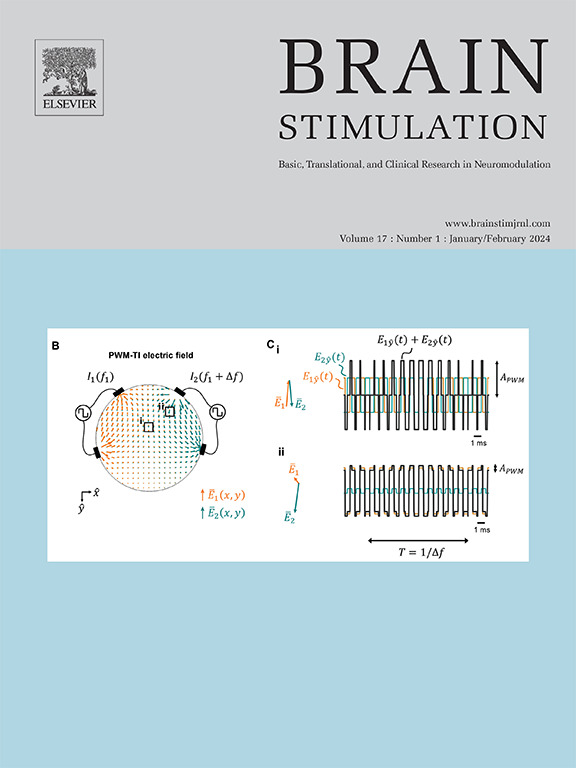Neuroprotective and plasticity promoting effects of repetitive transcranial magnetic stimulation (rTMS): A role for microglia
IF 7.6
1区 医学
Q1 CLINICAL NEUROLOGY
引用次数: 0
Abstract
Repetitive transcranial magnetic stimulation (rTMS) is a non-invasive brain stimulation technique used to modulate neocortical excitability, with expanding applications in neurological and psychiatric disorders. However, the cellular and molecular mechanisms underlying its effects, particularly the role of microglia –the resident immune cells of the central nervous system– remain poorly understood. This review synthesizes recent findings on how different rTMS protocols influence microglial function under physiological conditions and in disease models. Emerging evidence indicates that rTMS modulates microglial activation, promoting neuroprotective and plasticity-enhancing processes not only in models of brain disorders, such as Alzheimer's and Parkinson's disease, but also in healthy neural circuits. While much of the current research has focused on the inflammatory profile of microglia, critical aspects such as activity-dependent synaptic remodeling, phagocytic activity, and process motility remain underexplored. Given the substantial heterogeneity of microglial responses across brain regions, age, and sex, as well as their differential roles in health and disease, a deeper understanding of their involvement in rTMS-induced plasticity is essential. Future studies should integrate selective microglial manipulation and advanced structural, functional, and molecular profiling techniques to clarify their causal involvement. Addressing these gaps will be pivotal in optimizing rTMS protocols and maximizing its therapeutic potential across a spectrum of neurological and neuropsychiatric conditions.
重复经颅磁刺激(rTMS)对小胶质细胞的神经保护和可塑性促进作用。
重复经颅磁刺激(rTMS)是一种非侵入性脑刺激技术,用于调节大脑皮层的兴奋性,在神经和精神疾病方面的应用越来越广泛。然而,其作用背后的细胞和分子机制,特别是小胶质细胞(中枢神经系统的常驻免疫细胞)的作用,仍然知之甚少。本文综述了不同rTMS方案在生理条件和疾病模型下如何影响小胶质细胞功能的最新发现。新出现的证据表明,rTMS不仅在阿尔茨海默病和帕金森病等脑部疾病模型中,而且在健康的神经回路中,调节小胶质细胞的激活,促进神经保护和可塑性增强过程。虽然目前的许多研究都集中在小胶质细胞的炎症特征上,但诸如活动依赖性突触重塑、吞噬活性和过程运动等关键方面仍未得到充分探索。考虑到不同脑区、年龄和性别的小胶质细胞反应的巨大异质性,以及它们在健康和疾病中的不同作用,更深入地了解它们在rtms诱导的可塑性中的作用是必要的。未来的研究应结合选择性小胶质细胞操作和先进的结构、功能和分子分析技术来阐明它们的因果关系。解决这些空白将是优化rTMS方案和最大限度地发挥其在神经和神经精神疾病方面的治疗潜力的关键。
本文章由计算机程序翻译,如有差异,请以英文原文为准。
求助全文
约1分钟内获得全文
求助全文
来源期刊

Brain Stimulation
医学-临床神经学
CiteScore
13.10
自引率
9.10%
发文量
256
审稿时长
72 days
期刊介绍:
Brain Stimulation publishes on the entire field of brain stimulation, including noninvasive and invasive techniques and technologies that alter brain function through the use of electrical, magnetic, radiowave, or focally targeted pharmacologic stimulation.
Brain Stimulation aims to be the premier journal for publication of original research in the field of neuromodulation. The journal includes: a) Original articles; b) Short Communications; c) Invited and original reviews; d) Technology and methodological perspectives (reviews of new devices, description of new methods, etc.); and e) Letters to the Editor. Special issues of the journal will be considered based on scientific merit.
 求助内容:
求助内容: 应助结果提醒方式:
应助结果提醒方式:


